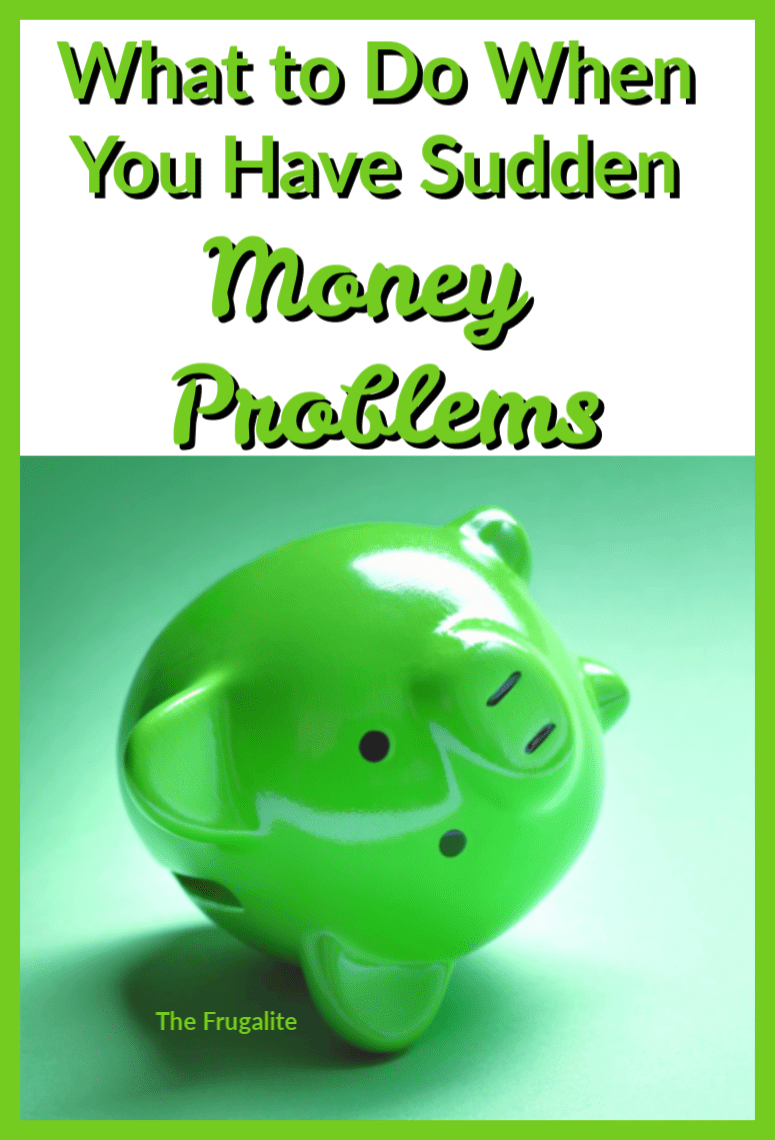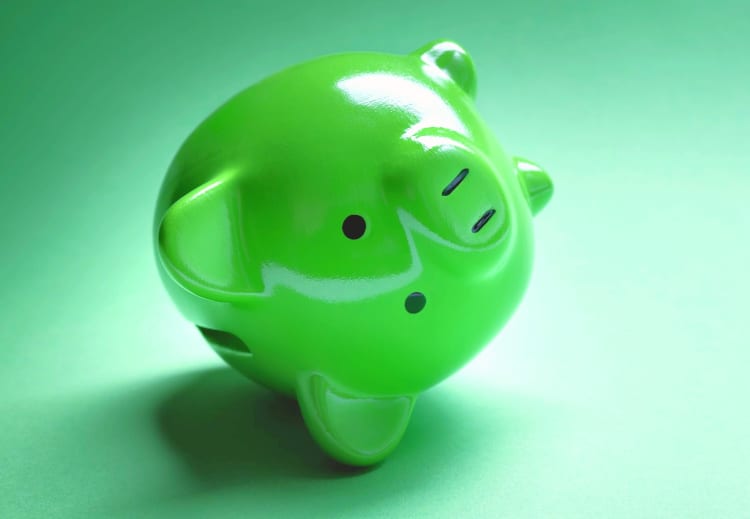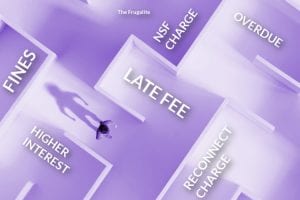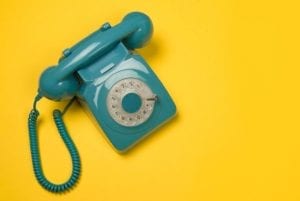(Psst: The FTC wants me to remind you that this website contains affiliate links. That means if you make a purchase from a link you click on, I might receive a small commission. This does not increase the price you’ll pay for that item nor does it decrease the awesomeness of the item. ~ Daisy)
I’m going to start this article telling you why February and March of 2018 were terrible months for me. I had some major financial problems, but there’s a moral to the story, so bear with me. (I’m not just whining or looking for sympathy, I promise.)
What I want you to take from this is how just about anyone can run into hard times financially, no matter how carefully you try to prepare. Although I know there should be no shame in this, I was terribly embarrassed when I ran into problems lately.
It’s what you do to bail yourself out of your financial problems that determines whether they’ll be ongoing or whether you’ll recover and get back to a state of comfort and security.
Medical bills took a chunk out of my financial security.
This was the year that a terrible flu-bug was going around the United States. So, when my youngest daughter became ill, I immediately began doing everything possible to help her recover. She’s normally a healthy person and we eat well, take all the right supplements, and nurture our immune systems. But, she works with the public in her program and flu happens.
Soon, I had run through my arsenal. We tried all sorts of home remedies and supplements, but this virus was relentless. Knowing as I did that this virus had become serious with many people, I took her to the doctor and the hospital. Not once, not twice, but three times.
We do not have health insurance because our monthly payment is double what I pay for rent, nearly $2000 a month for 60% coverage after we pay $10,000 in deductibles. (That’s a complaint for another day.) Instead, I sock away money for paying in cash. (Even after our recent crisis, my decision is the most cost-effective one.)
With two kids in college right now, my emergency fund is like everyone else’s – good but not unlimited. Within 3 weeks of my daughter’s illness, I’d gone through my entire emergency fund and maxed out two credit cards that are ordinarily unused. I don’t regret it for a second because her flu turned into bronchitis, then viral pneumonia – she needed medical care.
But I began March in overdraft in all three of my bank accounts and in thousands of dollars’ worth of credit card debt. I used a third credit card to buy gas to get everyone where they needed to go and I didn’t have a penny to my name.
It was a sickening feeling, especially after I’ve worked so hard to create an atmosphere of financial stability for my family. I felt physically ill every time I looked at my bank account online or saw another bill in the mailbox. I was embarrassed, frazzled, and feeling desperate.
Some of you may read this and think, “Wow, Daisy’s supposed to be telling us how to get out of debt and here she is maxing out credit cards and telling us about it. Unsubscribe!”
You can do that, but please consider continuing to read this article, just in case you fall on hard times yourself.
It can happen to anyone.
Obviously, I’m not telling you about our financial saga to make myself look bad. I’m telling you because I want you to know that no matter how much you try to do everything right, financial problems can happen to anyone, at any time. Whether you have $100 in the bank or $100,000 in the bank, something can happen that wipes out your emergency fund just like it did mine.
This doesn’t mean that you failed financially – it means that circumstances can affect you, just like they do everyone else, no matter how careful you are.
Before my daughter’s illness, I was doing everything “right.”
- I had enough money in my emergency fund to carry me through 3 months
- I had numerous credit cards with zero balances
- My only debt was my car
- My kids are going to school without student loans
- I opted out of health insurance because it was more financially practical to pay cash (and I still agree with that decision)
Everything was great.
Until it wasn’t.
It’s what you do next that makes all the difference.
So, here I am, the Frugalite Queen, with maxed-out credit cards, no emergency fund, and little in the way of disposable income.
But here’s the good news. If you know how to deal with these kinds of emergencies, it’s only temporary.
Here are the steps I’m taking to get things back on track.
- When I got paid next, I immediately put $500 in my emergency fund.
- I found some places to cut my monthly expenses. (Go here to read about auditing your expenses)
- We ate from our pantry and used personal care items from our stockpiles.
- I immediately began snowballing debt to pay it off quickly (Go here to read about the snowball method of debt repayment)
- I organized a yard sale to make some extra money and listed some bigger items on Craigslist
- I worked on some extra projects to bring in some cash, all of which went to debt.
- We pared our expenditures to the bare minimum this month.
Was it fun? Not really but it was necessary.
How I raised some money.
Lots of folks who knew my situation recommended that I put up a GoFundMe page and ask for donations, but I just couldn’t bring myself to do it. This isn’t to say bad things about people who do so – I’ve donated to many of them myself. But I felt that my situation, while exceptionally stressful, was not dire enough to ask for people to just give me money and that I had some resources to earn the money instead.
Because I’m a writer, I finished a book I had been working on and put it up for sale immediately.
You may have different talents that you can put to work to make extra money quickly, like consultations of some sort, custom-made handcrafted items, the food you’ve raised on your homestead, childcare, tutoring – you get the idea. Get your product or service to market quickly and reasonably, and worry about charging higher prices later.
We worked together as a family to reduce our expenses to an all-time low and use the supplies we already had on hand. While I still have some debt, I’ve begun to rebuild my emergency fund and pay things off as quickly as possible. We were able to do damage control and keep the negative effects of a bad month to a minimum.
And don’t forget to help others. As bad as your situation may feel, there are probably other people out there in the same boat or similar. Even something as small as a can of spaghetti sauce and a pack of noodles to the food bank can provide somebody who is facing hard times with a warm meal. This is my personal philosophy and it’s good in two ways – you’re helping someone out and you never feel as sorry for yourself if you are in a position to help others.
Here are the steps to take when financial disaster strikes.
The first thing to remember is that you must forgive yourself for getting into trouble financially. It can – and does – happen to just about everyone. It’s how you deal with it that determines whether you’ll regain your equilibrium afterward.
- Audit your situation. See where all your money is going, see how much debt you’re in, and see what the most immediate ramifications will be.
- Take care of the most important things first. In most situations, keeping your home paid for (rent or mortgage), paying utilities, and making your auto and insurance payments should come first. Take care of the things that will have the most immediate ramifications first.
- You may have to make some late payments on less vital things. If so, communicate with those to whom you owe money and try to make arrangements. This may affect your credit, but by communicating with them, you can keep damage to a minimum.
- Cut your expenses. When you audit your situation, you may find some places that you can slash your regular expenses. Don’t hesitate to reduce services that are unnecessary or to whittle down your monthly obligations. (More ideas here)
- Put a little money back into your emergency fund as soon as possible. This may sound counterintuitive but having a bit of money for minor emergencies means that you won’t need to rely on credit cards for these things, putting you even further in the hole.
- Pay off your debts. Use the snowball method to attack your debts. Start paying these off AFTER you pay for the things I recommended in step 2.
- Use the things you have on hand. Delay a trip to the store for as long as possible by planning a menu using the food in your pantry and freezer.
- Use the shampoo, soap, and personal hygiene products that you have already instead of buying new products.
- Raise extra money. This may come from selling things you don’t need, taking on some extra work, or by creating a product or service to sell. However you do this, use the extra revenue wisely to get out of debt and to rebuild your emergency fund.
It’s a difficult, humiliating situation, but it’s something you can fix. If you are in a longer-term, more dire situation, this article may be helpful to you.
Things will get better.
Things might be tough right now but know that it can happen to anyone, even me, the Head Frugalite. Take the right steps to regain your financial equilibrium and limit the long-term damage of your situation.
I hope that knowing it happened to me, too, is helpful. Have you ever been slammed with a sudden financial emergency? What did you do to get a handle on it? Let’s talk about it in the comments.












9 thoughts on “What to Do When You Have Sudden Money Problems”
When our youngest son was 13, our insurance was also high because we are self employed. We were paying $1800 at that time with a $5000 deductible, but we had to have it because it of some existing medical problems. Our son was healthy until one weekend he became deathly ill. He ended up with an emergency appendectomy – $21,000 with a week in the hospital because it turned out that wasn’t the only problem. They discovered kidney problems which required 3 more surgeries at a university children’s hospital. Wowza! (He has damage to one kidney but he’s doing fine and works for an insurance co so he has great insurance!) The 3 kidney and ureter surgeries ran around $45,000 because there were complications. Had we not had the insurance I’m sure it would have bankrupted us.
Everyone has a right to choose if they buy insurance or not, but it sure was a lifesaver for us at that time. I’m sorry you had to go through that!
I too have been there and was served papers by a debt collector. Fortunately, my family helped me out and now 12 years later I very little credit card debt and will never have another credit car.Very embarassing to say the least.Also very aware that some people don’t have the kind of family support I have.I’m truly blessed and wish debt was a total fantasy but it isnt. Hope and prayed that all Americans find a safe way out of debt if they find themselves drowning in.
Thank you Daisy for this honest article.( implore ya though to secured some type of medical insurance),
Blessings,
Sean
You are so right. We paid off our house, saved, and tried to do things right. I went without medical insurance for eight years because we thought we couldn’t afford it. When I reached medicare age I enrolled and got medigap coverage too to cover anything else that might come up. It’s pricey. But then I got cancer. About a year and a half into treatment, I added up all the expenses. It was a whopping $3,000,000. All paid for by insurance!!! I haven’t bothered to add up the medical expenses for the last 3 years, but there’ve been some doozies. If we hadn’t had that insurance – well I couldn’t have gotten the treatment I needed and we most likely would have gone bankrupt in the process too. Things happen to everyone. Just be prepared the best you can and don’t squander excesses when they come; save for that rainy day.
It happens to everyone, I’ve had my house deposit saved twice in the last ten years then wiped out . My kids have autism and some existing health issues. Insurance is of our reach. Cash has always been king. I’ve often gotten a discount from therapist / surgeons. We are now Luckily enough to qualify for a national disability insurance scheme , it’s got it’s problems but gosh it helps. I don’t regret spending money on my kids it was needed for early invention before we qualified and for aides to manage their day to day life needs. I’m out of debt and back to saving now for land instead of a house to do things differently. I couldn’t have gotten through without my stockpile. For two reasons, one money wise and secondly with autism they wouldn’t cope with sudden food changes , to taste, to texture, digestive issues. So a food bank could never help us. I just keep going doing what I can with what I’ve got and don’t give up. I don’t have an shame in our situation, it simple is what it is. I try to better it everyday. Good luck everyone !
Thank you Daisy. I love your blogs and what you write.
Years ago I had to suddenly leave a job for medical reasons and my income plunged 70%. It was very worrying but I got through by the grace of God. Recently my income dropped 60% but I don’t feel as panicked this time! This is undoubtedly because I have built up a deep pantry and have enough food in the pantry and freezers to last me well over a year. I also have a large garden and over 20 good fruit and nut trees, grape vines, raspberry canes etc. I’ll soon be adding some more hens.
I also managed to build up a reasonable emergency fund which thankfully I have not yet had to touch. It does provide some peace of mind. I know it doesn’t take much to wipe everything out but it feels a lot better having some cash reserves than not having them.
I’m also slashing every expense I can, right to the bone – cancelled 4 subscriptions, reducing phone and power bills, making sure there is no wastage, cutting back on buying any more groceries except what is absolutely necessary and so on.
I’m selling a lot of items I really don’t need or want and working to increase my income as much as possible. I have a small seed business which does quite well, plus I sell produce, plants, jewellery and crafts I have made, pictures, photos etc.
For me the secret is to keep chipping away, keep moving. I think to myself, what can I do about this? What is the one thing I can do right now to move towards that, something small and manageable? For example my deep pantry started with just buy an extra can or two whenever I went to the store and it’s amazing how quickly it can build up. When I started I had about 8 fruit trees but for the last 10 or so years I have planted a few more trees every year and now between the old and young trees I have an abundance of fruit, good to sell or eat!
Sometimes it’s hard but keeping a positive mental attitude really does help a lot.
Good wishes to everyone in these trying times!
Wendy
New Zealand
My husband got sick soon after my mother died. I’d stopped working to care for her and had just gone to work after not working for several years. His initial bill was $42,000. No income yet, car expenses to get to work, eating from Pantry, more expenses to see husbans in hospital over an hour away and talks with his doctors. A friend working for our county told me about a county fund for property tax papers. She got the application papers and I filled them out. Figured they may help some. They hadn’t had an application in a few years and paid the $42,000 in full. I kept working until doctors insisted he needed full time help. I cut backon hours and we searched for help. We found a program that would pay anyone except a spouse to help him. When his assessment came back he was approved for 68 hours week. My son quit his job and too 40 hours a week at $9 per hour. His wife took the other 28 hours. Over time wasnt allowed. I kept working until he became so helpless that it took two people to transfere him or toilet him. Byvthem b his disability income came through and I quit working and we lived frugally on $680 a month. When he died I was 55. No car. The engine had frozen up. 15 miles from the nearest town. No job. No help. I livex on stored food. I walked,4 miles everyday… sometimes 8 miles gathering twigs to heat food or water on a fire in my homenads bbq. Friends from another state contacted me they were coming through and wanted to stop for a quick visit. They arrived pulling a small car and a refridgerator on their trailer. A lady in their church wasn’t driving any longer abd they brought it to me. I sold thing to get used tires, a used battery, registered and license, and liability insurance on it. That took 4 weeks. Three weeks after that I had a job. I began immediately setting aside money while catching up bills left from when my husband died. I got electricity turned back on et. When I had $1000 saved up I asked my neighbor to watch for an other used car. I was required to have a dependable vehicle to keep my job. Id but parts and the neighbor would do the work to always have one on the road. Eventually both broke down at once. A car dealer sent a salesman to pick me up. He showed me three much newer car and made a deal. Three months of slightly higher payments became my down-payment then car payments kicked it at $214 per month. He was impressed with what he could see i’d done with a hard three years. Believe me I sent many customers his way. That 2 year-old car lasted me another 15 years. I gave it to son and he drove it almost a year when the transmission went out. I’d hit hard times before but that was the hardest.
Recently we (new husband an i ) h7 t a hard time. It took all our savings but we will soon start replacing it. It’s just good way to live.
wow.. you’re a fighter.
Some issues not yet discussed here:
Since surprise humongous medical bills are the single greatest fear of many families that might drive them into bankruptcy, some mediation strategies need mentioning.
1. Just because such a bill might be enormous does not automatically mean that it is valid, accurate or honest. If you run the search below on DuckDuckGo.com and then click the “more results” button as well, you’ll find many, many articles on inflated or dishonest medical bills, plus some strategies on how to audit and challenge them:
American medical bills when inflated, fraudulent, double-billed, billed for services not rendered
There are organizations that can either do that auditing and challenging for you, or can teach you how to do it yourself.
2, Medical bills in America have risen to become the highest such bills in the world (much like college bills). The reasons are complex but typically trace to the dirty tentacles of government and bad laws. As a result there is a thriving global industry of medical competitors. If you run a search on “Medical Tourism” you’ll find country after country with well-trained doctors and methodologies that the medical mafia-captured FDA has squelched in this country. As a result some of your best insurance would be to keep your US passport current to meet either planned or sudden unscheduled medical or dental needs. (Frequently on such adventures you’ll encounter US-trained practitioners who resented not being allowed to exercise their best medical judgments inside US borders.) One such example I only learned about this year was childbirth cost comparisons. In the US, the average uncomplicated (meaning no caesarean, eg) childbirth bill runs around $10,000 — in contrast, the similar bill in Panama runs about $100. (That’s where John McCain was born … to both parents who were US citizens, so he was still legally able to run for the US presidency).
As a result, one of my all-time favorite Dilbert cartoons was about flipping through his thick collection of wisdom on bumper stickers until he found the most useful, which advised to “Question Authority.”
–Lewis
Try: Samaritan Ministries, Liberty Health Share, or Medishare. Help others as you help yourself. No reason to be without help for medical events.